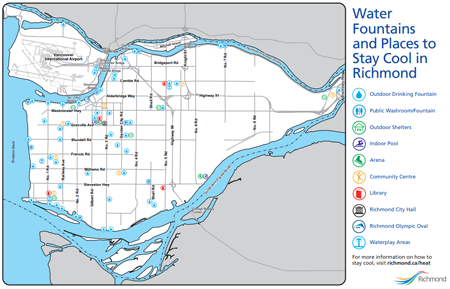Heat Safety & Air Quality

Although warm and sunny weather is a treat, hot temperatures come with certain risks. The City of Richmond encourages everyone to be safe in the heat and stay informed about heat-related health risks. Remember: Everyone is at risk for heat-related illnesses.
The City of Richmond has a comprehensive Heat and Poor Air Quality Emergency Operations Plan. This plan is aligned with the BC Heat Alert and Response System (HARS) to allow for a robust and flexible response to enhance public safety during extreme heat.
Keep households safe and get prepared by creating an extreme heat emergency plan: Extreme Heat Preparedness Guide
Follow the extreme heat safety tips in the section below and refer to the Richmond Cooling Map of water fountains, places to stay cool and misting stations around the City.

Richmond Cooling Map - Interactive Richmond Cooling Map - PDF
Places to Cool Off in Richmond
Cooling Centres
During an extreme heat event, select facilities may be open as Cooling Centres for those wanting to drop-in and have a seat to cool off or access cleaner air:
- When activated, specific Cooling Centre locations will be listed here.
- Indoor public spaces such as Community Centres, arenas, libraries and shopping malls also offer relief from hot weather during regular operating hours.
Libraries
The Richmond Public Library's Brighouse, Ironwood, Steveston and Cambie branch are open to the public. Visit the Richmond Public Library website for current operating hours. The Richmond Cultural Centre lobby and Cultural Centre Annex are also available for access during operating hours.
Art Gallery & Museum
The Richmond Art Gallery or the Richmond Museum is open Mondays through Saturdays. Visit websites for operating hours.
Outdoor Shelters and Pop-up Covered Spaces
Outdoor tents, shelters and picnic tables are available at the following locations.
Temporary pop up tents until the end of September:- Steveston Community Park
- Terra Nova Rural Park
- South Arm Community Park
- Minoru Park
- Dover Neighbourhood Park
- Garden City Community Park
- McLean Neighbourhood Park
Spray Parks
Current information on spray parks can be found on our spray parks and waterplay page.
Misting Stations
Misters will be deployed during all Heat Warnings to provide the public with respite. Locations will be listed below when activated.
Pools, Arenas and Other Indoor Programs
Drop-in to City pools or arenas for a visit, or enjoy other drop-in or registered programs and activities in City facilities.
Browse the schedule or to register, visit richmond.ca/register, call 604-276-4300 (Mon-Fri, 8:30am-5pm), or visit community facilities in-person.
Richmond Olympic Oval
The Richmond Olympic Oval is open for programs and drop-ins during operating hours. Visit the website for more information.
Water Fountains
There are several water fountains installed across Richmond to provide clean drinking water. View the map above for water fountain locations.
Extreme Heat Safety Tips
1. Keep cool
- Turn on the air conditioning, fans and spend time in a cool environments, if possible.
- Use public splash pools, water parks or pools, or take a cool bath or shower.
- At high temperatures, fans alone may not be effective. Applying cool water mist or wet towels to your body prior to sitting in front of a fan is a quick way to cool off.
- Dress for the weather by wearing loose, light-coloured, lightweight clothing. Protect yourself from the sun by wearing a wide-brimmed hat and sunglasses.
- Avoid sunburn, stay in the shade and use sunscreen with SPF 30 or more.
- Keep your home cool. Open windows (ensuring children are not at risk of falling from them), close shades or blinds, use an air conditioner and prepare meals that do not require an oven.
- Avoid working or exercising in the heat. If you must, drink two to four glasses of non-alcoholic fluids each hour. Limit outdoor activity during the day, opt for early mornings or late evenings.
- If you are taking medication, particularly for mental illness, heart disease or Alzheimer's disease, ask your doctor or pharmacist whether heat exposure increases your health risk.
2. Stay hydrated
- Regularly drink non-alcoholic beverages (preferably water), even if you are not physically active. Don't wait until you are thirsty.
- If your doctor generally limits the amount of fluid you drink, or you have been prescribed water pills, ask about increasing the amount of water you can drink while temperatures are high.
3. Food safety
- It's also important to keep certain foods chilled to prevent food poisoning. Always refrigerate food and leftovers promptly at 4°C or below. Keep luncheon meats, pasta salads or other perishable foods in an insulated cooler packed with lots of ice or several ice packs.
4. Check on others
- Conduct regular check-ins on your family, friends and neighbours to make sure others are safe -- especially those who are living alone.
- The most vulnerable to high temperatures include young children, pregnant women, elderly (who are housebound in un-airconditioned homes), individuals at risk for homelessness or who are experiencing homelessness, individuals who struggle with mental health, persons with chronic and/or underlying health conditions such as heart and lung conditions, diabetes and cancer.
- Ask whether people know how to prevent heat-related illness and are taking precautions.
5. Keep an eye on pets
- Bring lots of water on walks and watch for signs of overheating.
- Hot pavement can have painful consequences for your dogs. A quick and easy test to see if the street enough for a walk with your dog is to put the back of your hand on the pavement. If you can't keep it there for five seconds, it's too hot for your dog's feet.
- If possible, wait to walk or run your dog when the temperature drops a bit, or stay on the grass. Don't go out in the hottest part of the day.
- DO NOT leave your pets or children in your car. Leaving them, even for a short amount of time or with the windows open, can be fatal.
6. Seek help
- When it is hot outside, it can be easy to become dehydrated or suffer from a heat-related illness. Symptoms can include: sweating, dizziness, nausea and/or vomiting, heat rash, cramps, muscle pain, weakness and/or tiredness, fainting and even the worsening of some pre-existing health conditions.
- Heatstroke is a life-threatening medical emergency. If you feel dizzy or disoriented, call 911 for immediate assistance.
- If you spot someone who has a high temperature and is unconscious or confused, or has stopped sweating, offer assisting by providing water and moving them to a cool shady spot (if safe to do so), and call for medical assistance.
- If you see an animal or child in a hot car, note the license plate, contact 911 and then the BC SPCA helpline at 1-855-622-7722.
7. Get informed
- Listen to trusted local news sources and weather channels.
- Follow the advice of local public health authorities such as HealthLinkBC (dial 811).
- Check out "More Resources" in the tab below for more.
More Resources
- Beat the heat - HealthLink BC
- Extreme Heat Preparedness Guide - Prepared BC
- Extreme heat safety tips - Government of Canada
- Summer pet safety - BC SPCA
- Air Quality Map (AirMap) - Metro Vancouver

